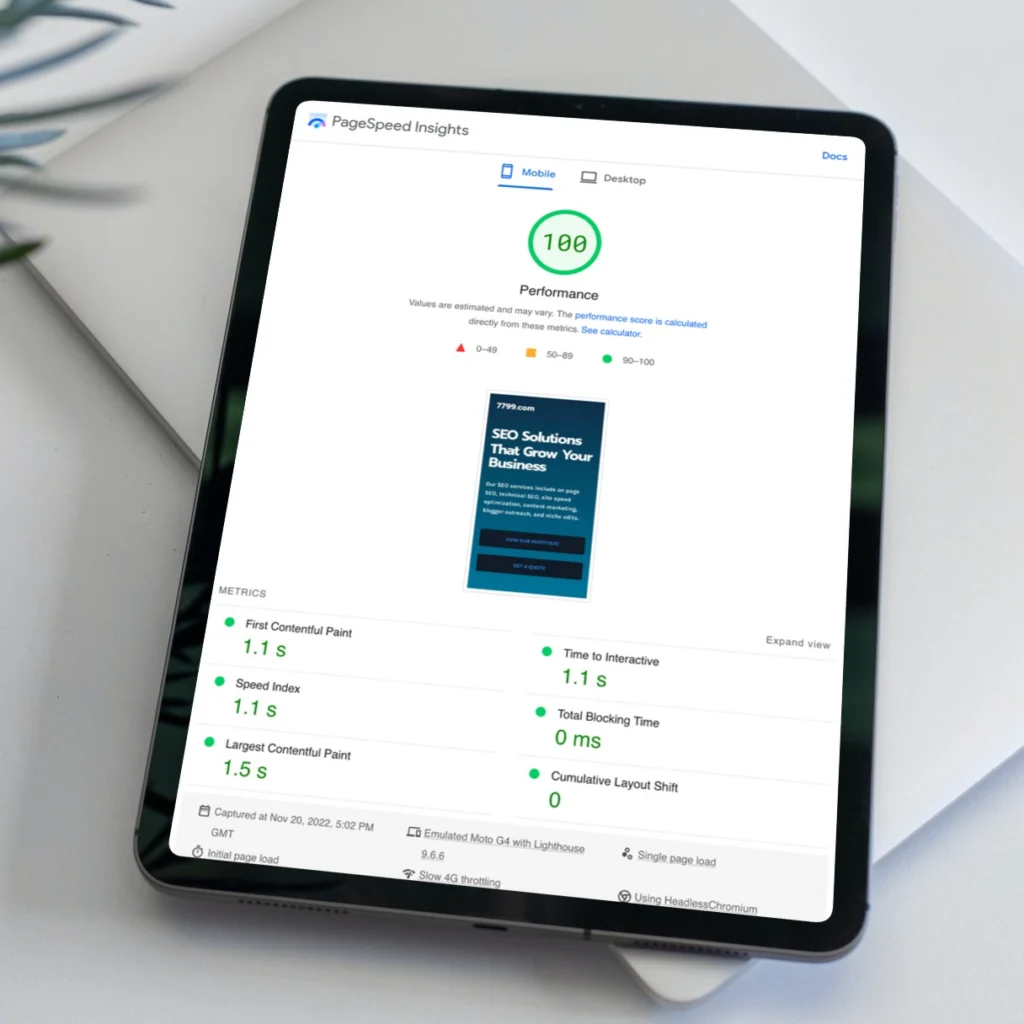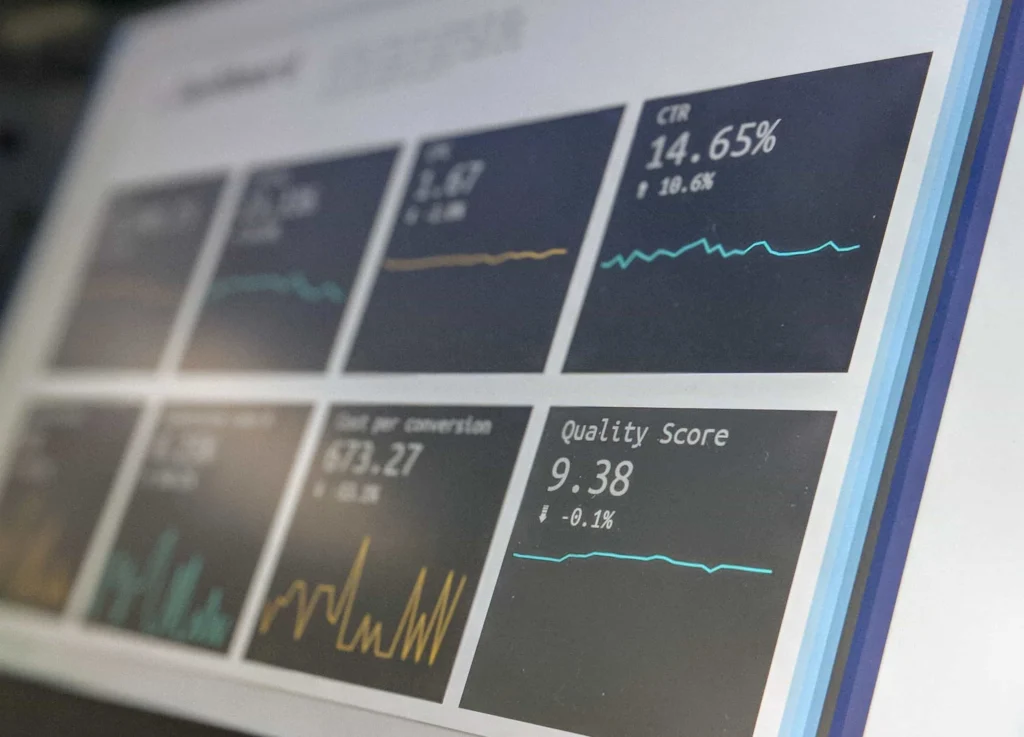Page Speed Optimisation
We offer a wide range of page speed optimisation services to help you solve Core Web Vitals issues, improve your Google PageSpeed Insights score and solve other problems with your website.
Why Is Page Speed So Important In 2024
Page speed optimisation services are essential for businesses and organisations to ensure their webpages load quickly. This is because slow page loading times can damage user experience, reduce search engine rankings and even lead to lost revenue. Therefore, understanding the benefits of these services and how they can be implemented effectively is highly important.
The importance of page speed cannot be understated in 2024. Faster loading times increase user experience, resulting in higher conversion rates and more satisfied customers. Page speed is a key indicator of the performance of a website, impacting both user engagement and customer loyalty. A poor performing webpage can cause visitors to abandon their browsing session, leading to lower conversions and reduced sales.
Page speed is an essential factor for any business looking to make the most out of its online presence. With advancements in technology such as faster internet speeds and improved web browsers, users expect websites to load almost instantly – anything less than that is considered unacceptable by many consumers today. As such, it is important for businesses to optimise their pages for maximum efficiency in order to ensure a positive user experience and maximise potential profits from website visits. Optimising page speed will also help improve search engine rankings as Google favours fast-loading sites over slower ones when deciding which pages should appear first in organic searches results.




What Kind of Page Speed is Regarded as Optimal?
Optimising page speed for maximum efficiency is an important factor in providing a great user experience and ensuring the success of any website. However, what exactly constitutes optimal page speed? This can vary depending on the type of website being visited – some pages require faster loading times than others due to their complexity or size; however, generally speaking, it is regarded as best practice to have webpages load within two seconds or less. Anything that takes longer may cause visitors to abandon their browsing session before they even get a chance to view the content they were looking for.
Fortunately, there are many ways businesses can ensure their websites are running at peak performance when it comes to page speed optimisation. These include reducing image sizes, minifying code, caching frequently-used elements, and using CDNs (Content Delivery Networks). Additionally, businesses can consult with experienced professionals, such as those from Attainment Marketing, who offer specialised services such as speed optimisation services that analyse site configurations and make specific recommendations tailored towards improving overall page load speeds.


Improved User Experience
If a website loads faster, visitors will have a better experience. They are more likely to stay on the site and browse for longer periods of time rather than growing frustrated and abandoning the site due to slow loading speeds.


Better Search Engine Rankings
Search engines such as Google consider page speed as a ranking factor, enhancing the speed of your website can improve its ranking. This can lead to more organic traffic and potential buyers finding your website.


Increased Conversion Rates
Users are more likely to finish a purchase or sign up for a service when the website is fast and responsive. This can also lead to a rise in conversion rates, which is another benefit of having a website that loads quickly.
Is Your Website Fast Enough?
No matter how well-designed or feature-rich a website is, the success of any online business depends on its ability to provide visitors with fast and easy access to information. When it comes to page speed optimisation, ensuring pages load quickly can make all the difference in providing customers with an enjoyable browsing experience – if loading times are too long, users may become frustrated and abandon their search without ever seeing what your website has to offer.
Therefore, businesses should take steps to ensure that their websites are running at peak performance when it comes to page speed optimisation.
I was amazed by the results of Page Speed Optimisation. After they optimised my website, the loading time was dramatically reduced. Consequently, my website’s user experience and ranking were improved. It was totally worth the investment.
Why Is Website Speed Optimisation Important?
It is widely accepted that website speed optimisation is essential in providing customers with an enjoyable browsing experience. Not only does page loading speed affect user satisfaction and loyalty, but it also has a direct impact on search engine rankings as well. Google’s PageSpeed Insights tool provides webmasters with reports that measure how quickly content loads on both mobile and desktop devices. Having a fast-loading website can help businesses rank higher in relevant searches and increase visibility for their products or services.
Our optimisation services are available to help companies achieve the fastest possible speeds when it comes to loading times. We offer comprehensive packages which include performance monitoring tools to track any changes made during the optimisation process. By working with our specialised speed optimisation professionals, businesses can ensure that their websites are loading as fast as possible.


The Differences Between Site And Page Speeds
When it comes to website speed optimisation, it is important to differentiate between site and page speeds. Site speed refers to how quickly the entire website loads on a device, while page speed measures the loading time for individual pages. Since both of these factors affect user experience, businesses should strive to optimise their website overall as well as each page separately.
Companies must be mindful when selecting services in order to ensure they are receiving solutions tailored for their needs. Increasing website performance and retaining customers can be achieved by consulting with our well-experienced professionals who specialise in speed optimisation.
Advantages Of Improving Site Speed
The advantages of improving site speed are significant. Fast loading times allow businesses to provide visitors with an enjoyable experience and make sure the website is competitive in the market. Core Web Vitals, which measure how quickly a page responds to user input and loads content, are becoming increasingly important for SEO rankings on search engines like Google. By increasing page speeds, companies can ensure their websites appear higher up in these results, leading to more potential customers.
Furthermore, faster sites also help reduce bounce rate when users arrive at pages that take too long to load. Site speed optimisation services can help lower this risk by eliminating any unnecessary code or oversized images from impacting performance. This not only prevents visitors from leaving early but can also have a positive impact on conversions. With improved website speed comes better engagement rates with customers who will be more likely to stay longer and browse further than those using slow-loading sites.


TIP: If you want to ensure maximum efficiency with minimal effort invested, then look no further than our expert site speed enhancement services. We provide comprehensive solutions that leverage both software-based tools and manual technical optimisations to significantly reduce page loading times while simultaneously improving overall UX/UI experiences across all platforms.
3 Tools For Improving The Performance Of Website
It is essential to have the right tools when it comes to improving website performance. While many WordPress plugins offer speed optimisation, a number of free and premium tools are available online to monitor and test the performance of websites. Google Pagespeed Insights, for example, provides detailed analysis on how quickly pages load across different devices and browsers. By using this tool, businesses can identify potential issues with their pages before they become significant problems.
Additionally, developers should look for ways to improve code efficiency as part of any page speed optimisation project. Redirects should be reduced and unwanted codes or themes should be removed from websites, which may slow down page loads. Compression techniques such as Gzip and Brotli can also be utilised to reduce file sizes without compromising quality, further helping improve overall loading times for visitors. Ultimately, having the right tools in place is key for ensuring maximum performance from web pages so businesses can continue delivering an excellent user experience well into the future.
What Factors That Affect Load Times?
When it comes to page speed optimisation, there are a variety of factors that can affect loading times. One of the most important is ensuring that websites have been optimised for mobile devices. WordPress speed optimisation services should be used in order to ensure that pages load quickly on both desktop and mobile devices. Additionally, image optimisation should also be applied as large images can slow down sites significantly.
Finally, caching solutions and content delivery networks (CDN) can significantly improve loading speeds by serving up static versions of webpages from servers located closer to users. This reduces server load while speeding up the time it takes for browsers to download files. By utilising these tools along with other optimisations, businesses can deliver exceptional user experiences across all platforms without sacrificing page speed or performance.


Does The Page Speed Of Your Website Need Improvement?
It is clear that page speed optimisation should be a priority for any website aiming to maximise its potential. As analytics have shown, slower loading times can greatly impact search engine rankings and user experience. Fortunately, there are tools available such as WordPress speed optimisation services which enable developers to optimise website performance on both desktop and mobile devices.
Moreover, investing in these services will result in increased Google Pagespeed scores which leads to better overall SEO ranking and visibility. Thus, businesses looking to increase their reach must ensure they incorporate all the necessary factors into their page speed optimisation strategy if they wish to see tangible results.
How Much Does Improving Site Speed Cost?
The cost of improving the speed of a website can vary depending upon the services employed. Generally, search engine optimisation and page speed optimisation services will involve an upfront fee for setup followed by recurring payments depending on the size and scope of the project. A typical package might include image compression, browser-level caching, lazy loading images, minifying code, Gzip compression, server level caching solutions as well as CDN network integration to serve up static versions of webpages from servers located closer to users. This will result in faster load times and improved SEO ranking across platforms.
Contact Us
Have a question or require assistance? Please use the form to contact us, and we will get back to you as soon as possible.
Frequently Asked Question
Our Other Services
Ready to Grow Your Business?
With our page speed optimisation services, you can drive more traffic to your website. Our team of experts will optimise your site for success in 2024 and beyond. Get started by getting in touch with us today.


